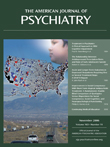An Inverse Relationship Between Perceived Harm and Participation Willingness in Schizophrenia Research Protocols
Abstract
Objective: This study attempted to clarify how people with schizophrenia evaluate the potential harm associated with various research-related procedures and how these assessments relate to participation willingness. Method: The authors conducted a semistructured interview among participants with schizophrenia. Results: Sixty participants with schizophrenia rated four procedures as harmful (e.g., symptom induction), five procedures as moderately harmful (e.g., being given a placebo), and six procedures as not harmful (e.g., undergoing a physical examination). Rated willingness to participate was inversely related to the participants’ perceptions of harmfulness for all procedures. Conclusions: In this study, people living with schizophrenia perceived different research procedures as posing different levels of possible harm. Potential harm appears to be an important consideration in protocol enrollment decisions. This work reaffirms the value of clarifying the strengths of seriously ill people who may choose to participate in research.



